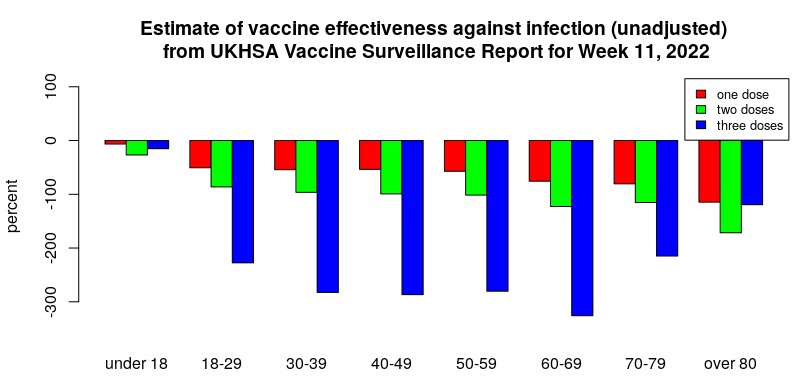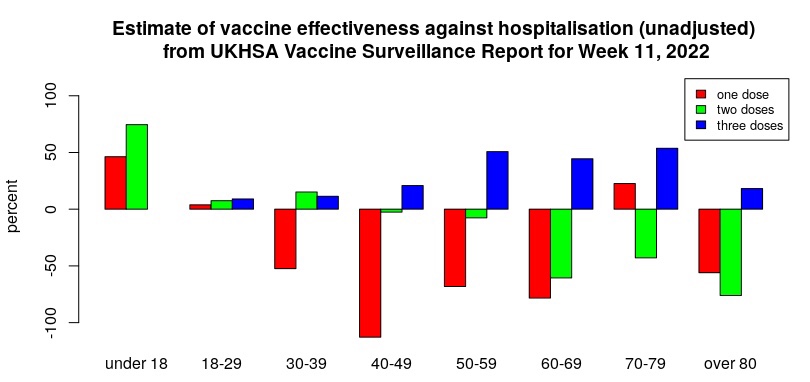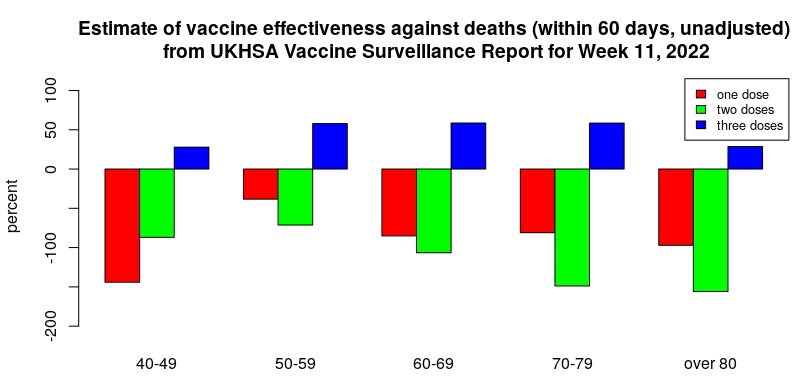UK data indicates vaccines are ineffective against infection, and unboostered are worse off than the unvaccinated for protection against hospitalization and death
Britons who had their COVID booster shots tested positive for COVID significantly more than unvaccinated and unboosted Britons across most age groups, according to the latest data.
According to an analysis published in the Daily Sceptic which crunched the latest numbers from the UK Health Security Agency for weeks 7 -10 of 2022, the effectiveness of the vaccine to protect against COVID infection is solidly in the negative.
Negative efficacy means that proportionally, the vaccinated are testing positive for COVID more than the unvaccinated, in some cases by 100% to 300%. The figures are ‘normalized’ to balance the fact that there are many more people who are vaccinated.
Frontline News reported this trend since it began in October 2021. At that time it wasn’t clear if it was a short-term glitch or if it would continue. Now with six more months of data, it appears to be a consistent and growing phenomenon.
The following graph shows the dramatic association between COVID vaccination and new infections.
In the graph, 0 represents the unvaccinated. Across all age groups, the vaccinated tested positive more than the unvaccinated. For the most part, the more injections received, the higher the likelihood of testing positive.

The above data suggest that vaccine mandates aimed at reducing the spread of COVID may have had the exact opposite effect.
It further suggests that ‘green pass’ and other apartheid policies designed to restrict the unvaccinated from fully participating in society are without merit. This is because the vaccinated are getting infected and thus infecting others more than the unvaccinated, not less, as previously claimed. If anything, the “fully vaccinated” should have their freedoms restricted.
Protection from hospitalization and death
The lack of vaccine protection against infection has been acknowledged and often accompanied by reassurances that the vaccine still protects against severe illness and death.
The latest data from the U.K. show that vaccinated individuals who did not maintain the vaccination regimen by getting the recommended boosters faired poorer than those who were never vaccinated at all.
The following graphs show that across most age groups, having only two shots eventually provided less protection against hospitalization and death than having had no shots at all.


To be clear, the boosters are associated with fewer hospitalizations and deaths, as shown by the blue bar. It is also clear that first and second doses alone are correlated with more hospitalizations and deaths.
If the injections decrease the body’s ability to fight off COVID infections, does that mean the shots are damaging the immune system?
The data in the report has its limitations. An example is testing bias. Is each group being tested at the same rate? Maybe there are more unvaccinated that are getting COVID but are not getting tested. This could help explain the gap in infections. It would not explain hospitalizations and deaths though, since all individuals presenting with severe COVID symptoms would have been tested.
While the data is risk stratified by age group, other significant risk factors that influence hospitalization and death are not included in the data. Maybe those with serious health factors also tended to get more shots.
On the other hand, the data could support the warnings made by some, including former VP of Pfizer, Dr Michael Yeadon who remarked last year, that “We should anticipate seeing immune erosion more widely.”
Canadian immunologist, Marian Laderoute, referred to similar data from the UK saying that the situation is “most likely…reflective of ADE (antibody-dependent enhancement) of infection.”
Regardless, data on infections, hospitalizations, and deaths based on vaccination status will be a thing of the past come April.
The UKHSA report explains on page 37 that it will no longer provide such information, claiming that since the UK government won’t be providing free and universal PCR testing, it will “affect the ability to robustly monitor COVID-19 cases by vaccination status.”

